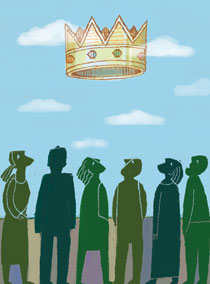Issue Archive
Commentary: The Lord Is One, With Facets

Prayers of kingship, malkhuyot, are present in the Rosh Hashana liturgy. Yet the concept of malkhut (kingship) has been problematic since Saul, the first Hebrew king. Saul, you remember, was the tall, handsome choice of the people, anointed reluctantly by Samuel the prophet, who warned the Israelites: “The day will come when you cry out because of the king whom you yourselves have chosen” (I Samuel 8:18). Through his prophet, God indicated his displeasure with the Hebrews for not finding heavenly rule to be enough and for wanting an earthly king “like all the other nations.”
As we know, King Saul came to a bad, sad end. Jealous of David, disobedient to God, he was ultimately stripped of his kingship by the same prophet who anointed him. His successor, David, managed to keep his crown but endured many calamities—a rebellion fomented by his beloved son Absalom; and beyond that, a grandson’s bad choices split David’s realm into the warring kingdoms of North and South, Israel and Judah.
It is a little surprising, then, to find the word kingship so lovingly used in the Holy Day liturgy, without a shadow of self-consciousness.
“Avinu Malkeinu,” our Father, our King, is the mantra of the Rosh Hashana prayers, perhaps to reinforce our understanding of God’s power and value.
But this is kingship of a different kind—heavenly, not human—the might and authority of one sole God.
Maybe the liturgists went a little overboard in their desire to assure God that, though the Jewish people clung to their craving for a secular ruler (the Bible seems to fall in love with David despite his transgressions), they were not about to forget who the King of Kings really was, or the awesomeness of God’s might.
The kabbalists of the Middle Ages put forth a nuanced picture of God. They depicted a divinity that is comprised of different aspects, as if they were parts of a human body. At the head is ketter, crown, suggestive of royalty. Then, through out-branching of different paired aspects—justice opposed to mercy, power opposed to love and so on—we come down to the bottommost aspect, where we find, surprisingly, malkhut. Another name in Kabbala for this nethermost sphere is Shekhina, the female aspect of God, earthly presence of the divine. Still another name is Knesset Yisrael, the community of Israel.
I would like to suggest that when we think of the divine kingship we might—though we are monotheists—try to think double: kingship/father and Shekhina/female presence. Think highest and lowest. Imagine as above, so below. Think single authority, Avinu Malkeinu, and also think community, whose role, according to the kabbalist narrative, is to repair, through deeds of goodness, a world broken at its inception. Envision all facets of God and all of us.
I confess that something like this is on my mind when I say theShema, which proclaims God as One. But because we know about those aspects of God that the kabbalists have described to us, all those aspects that God must struggle to bring into balance while we struggle to do the same in our own lives, I am also thinking, “Please, God, be One.”
While we contemplate kingship and queenship, we and the godhead make efforts to encompass high and low, ordaining and listening, judgment and mercy, power and love, single highest authority and also community of Israel. All of us are hoping and praying to come into balance, to gather together our fragmented selves, to bring wholeness to our complicated, self-contradictory lives, to become our best selves.
At least on Rosh Hashana.










 Facebook
Facebook Instagram
Instagram Twitter
Twitter
Leave a Reply